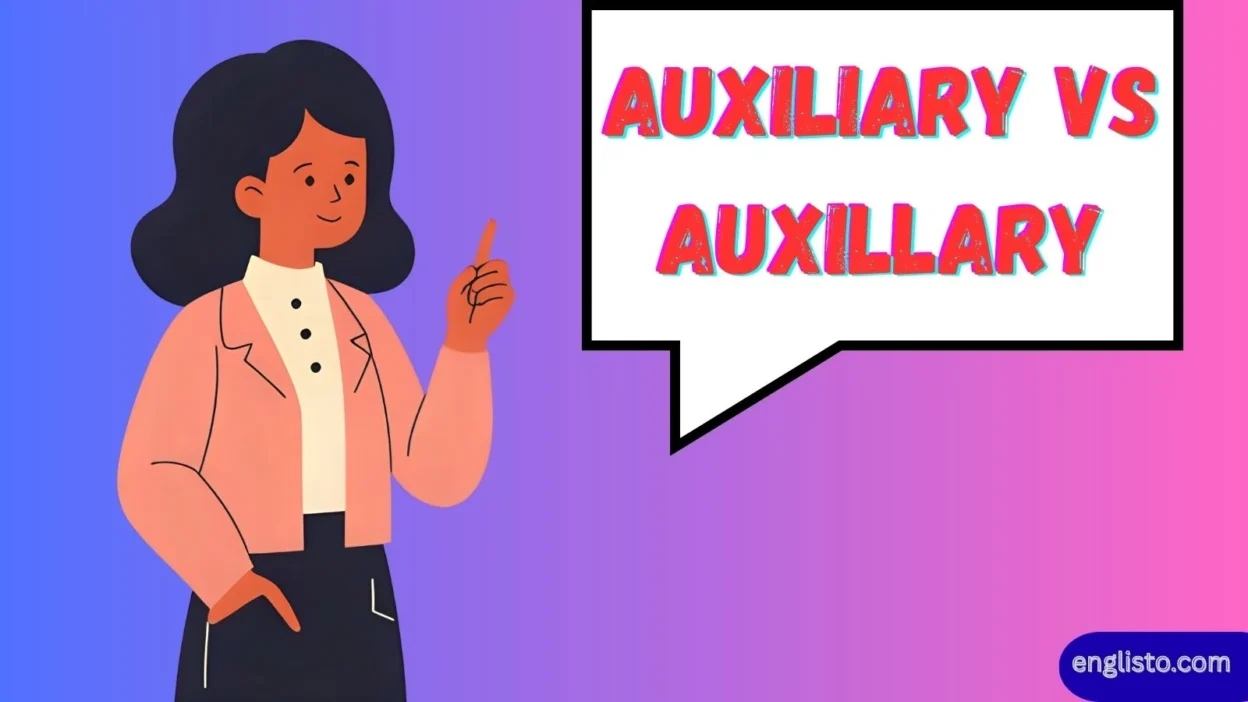Language is full of little traps that can catch even seasoned writers off guard. One such trap lies in the spelling of the word “auxiliary”—a term with rich history, varied uses, and great importance across English grammar, the military, medicine, engineering, and even everyday conversation. Its common misspelling, “auxillary,” trips up countless students, professionals, and even native speakers. Auxiliary vs Auxillary.
This article unpacks the differences between auxiliary and auxillary, explores why the latter is considered an error, and dives deep into the functions, meanings, and real-world applications of this essential word. We’ll examine its grammatical role, practical usage in fields from medicine to engineering, and give you tools to avoid mistakes. Along the way, examples, tables, and tips will clarify every aspect of the confusion so you’ll never second-guess yourself again.
What Does “Auxiliary” Mean?
At its core, the word auxiliary comes from the Latin auxiliarius, meaning helper or aid. True to its roots, it consistently conveys the sense of something providing additional support, backup, or assistance.
Common Definitions of “Auxiliary”
| Context | Definition | Example Sentence |
| Grammar | A helping verb that supports the main verb by indicating tense, mood, or voice. | It is raining outside. |
| Military | Supplementary troops or units that support the main army. | The general called in the auxiliary forces for reinforcement. |
| Engineering/Medicine | A supplemental system, part, or staff that assists the main function. | The hospital had an auxiliary generator during the blackout. |
| Everyday Usage | Anything secondary yet supportive. | She works as an auxiliary nurse on weekends. |
So, whether you’re describing a verb, a nurse, a motorboat engine, or even a battery backup, auxiliary refers to something secondary yet vital.
Read More: Smooth vs Smoothly: Understanding the Difference and Using Them Correctly
Why “Auxillary” Is a Misspelling
It’s tempting to assume auxillary is a valid alternative spelling. After all, English has plenty of words with double consonants. But in this case, dictionaries—Merriam-Webster, Oxford, and Cambridge alike—are united:
- Correct: auxiliary
- Incorrect: auxillary
Why the Mistake Happens
- Phonetic Trap – The way many people pronounce “auxiliary” naturally inserts an extra “l.”
- Spelling Confusion – English words like ancillary (with a double “l”) trick writers into thinking auxiliary follows the same pattern.
- Speed Errors – In quick writing, “auxillary” feels natural and often goes unnoticed until proofread.
A Simple Trick to Remember
Think: “Auxiliary helps with grammar and support. No ‘extra L’ needed.”
Auxiliary in English Grammar
When discussing grammar, the word “auxiliary” takes on a specialized, powerful role. It refers to the helping verbs that work alongside main verbs to express time, mood, voice, and intention.
The Core Auxiliary Verbs
English has three main auxiliaries:
- Be → used for progressive and passive forms (She is working.)
- Have → used for perfect tenses (He has finished his dinner.)
- Do → used for questions, negatives, and emphasis (She does like music.)
Modal Auxiliaries
These auxiliaries express possibility, necessity, or permission:
- can, could, may, might, must, shall, should, will, would
Examples:
- I can run five miles.
- You must finish your homework before the movie.
- She might join us later.
Functions in Sentences
| Function | Auxiliary Example | Sentence |
| Progressive aspect | is, was | I am reading a book. |
| Perfect aspect | have, had | She had studied before the test. |
| Passive voice | be + past participle | The cake was eaten by Harry. |
| Negation | do/does + not | Sara doesn’t work on Saturdays. |
| Questions | do, have, be | Is Paula coming to the party? |
Auxiliaries make our sentences more precise, flexible, and meaningful. Without them, English would lose its nuance.
Auxiliary in Real-Life Contexts
The word goes far beyond grammar. It pops up in everyday speech, professions, and technical fields.
In the Military
- Auxiliary forces refer to units that support the main army.
- Historically, the Roman legions used auxiliarii—non-citizen troops providing essential help.
“Auxiliary units may not be the core of the army, but they often turn the tide of battle.”
In Medicine
- Auxiliary nurses support doctors and registered nurses, handling vital tasks.
- An auxiliary treatment can mean an additional medication or therapy that complements the main one.
In Engineering & Technology
- Auxiliary engines on boats kick in when the wind fails.
- Auxiliary power units (APUs) in airplanes ensure safety if the main systems fail.
- Auxiliary cables (AUX cords) connect phones to stereo systems, keeping music alive.
Everyday Situations
- During a blackout, a family relies on an auxiliary generator.
- At a parade, the auxiliary police handle crowd control.
- In sports, an auxiliary player may substitute during a busy season.
Auxiliary, in every domain, means support that saves the day.
Synonyms and Related Words
Sometimes understanding a word becomes easier by connecting it with its synonyms.
| Synonym | Context of Use | Example |
| Supplementary | Academic or professional | The course has supplementary readings. |
| Backup | Everyday, tech | Always keep a backup of your files. |
| Secondary | General | They offered a secondary plan. |
| Substitute | Sports, workforce | An auxiliary teacher worked as a substitute. |
| Supporting | Medicine, army | The supporting staff were crucial during surgery. |
Common Mistakes to Avoid
- Confusing with “ancillary” → both mean supporting, but ancillary often describes a less central role than auxiliary.
- Doubling the L → always spell auxiliary with one “l.”
- Overusing in casual speech → sometimes simpler words like extra or helping work better.
Practical Tips to Master “Auxiliary”
- Use a Grammar Checker – Tools can catch the sneaky “auxillary” typo.
- Double-Check Dictionaries – Sources like Merriam-Webster or Oxford confirm the standard.
- Practice Sentences – Write 5–10 examples daily:
- The dog was bitten by a snake.
- We have been studying all month.
- The dog was bitten by a snake.
- Understand Context – Know when auxiliary is a noun (helper, support) and when it’s an adjective (providing help).
Frequently Asked Questions
What is the correct spelling: auxiliary or auxillary?
The correct spelling is auxiliary. Auxillary is always a misspelling.
Why do people confuse auxiliary with auxillary?
Because of pronunciation and the influence of similar words like ancillary.
Can auxiliary be both a noun and an adjective?
Yes. As a noun: The auxiliaries supported the army. As an adjective: The hospital used an auxiliary generator.
What are auxiliary verbs?
They’re “helping verbs” like be, have, do, and modals (can, may, must). They shape tense, mood, and voice.
Is auxiliary used in everyday life outside grammar?
Absolutely. Think auxiliary nurses, auxiliary engines, auxiliary cables, auxiliary police—all forms of backup or support.
Conclusion
The difference between auxiliary and auxillary boils down to correctness. While auxiliary is deeply rooted in Latin, firmly established in English grammar, and widely used across countless fields, auxillary remains nothing more than a common mistake.
Whether you’re studying grammar, writing essays, working in medicine, sailing with an auxiliary engine, or relying on auxiliary power during a blackout, the word embodies support, backup, and assistance.
Getting it right isn’t just about spelling—it’s about precision, professionalism, and effective communication. So next time you write it, remember: auxiliary helps; auxillary hinders.



